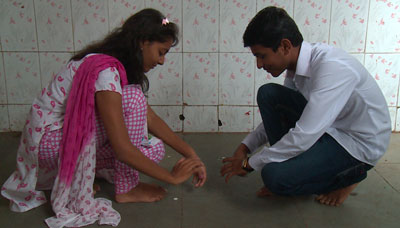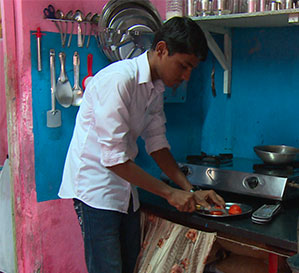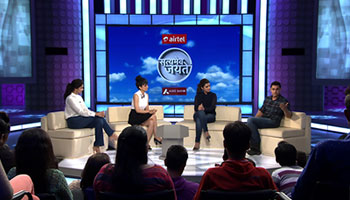From Team Satyamev Jayate

The sixth and final episode of Season 3 begins with a very interesting social experiment with the audience, which consists of an equal number of male and female participants. Aamir asks the men to spell out the qualities of a ‘real man’ (asli mard) and the replies range from ‘protector’ and ‘sensitive’ to ‘helpful’ and ‘honest’. When the women are asked to react, they have just the opposite to say. Men disrespect women, they are emotionally weak, dominating, arrogant, aggressive, and egotistic. While the men idealized themselves, the women spoke about the real men they encounter daily.
Aakash, the eldest son of Mahendra Singh and Aradhna Singh had an encounter with such ‘real men’ on the road when his two-wheeler grazed a bike. The bikers, father and son, attacked Aakash with the father egging his son on. Aakash was killed in the attack.
This cultivation and celebration of male violence takes place not just among the uneducated but in our premier educational institutes which produce doctors, engineers and other professionals. Despite the strict orders of the Supreme Court, ragging continues in college unabated. Freshers are subjected to the most depraved violence by their seniors leading to mental and physical trauma and even death. Triveni Sahai Gangwar’s son, Amit, died in one such incident where the authorities turned a blind eye to what was happening in the hostels. Gaurav Singhal, national coordinator of Society Against Violence in Education (SAVE), an anti-ragging organization, points out that every year the UGC helpline gets around five to six lakh calls for help. (Watch: Violent masculinity). These acts of violence are not stray incidents. Sashi Bala lost her son when a few men beat him up after his auto grazed their car. (Watch: Think before you act)
In India, 95% of violent crimes are committed by men. Valerian Santos, who lost his young son Keenan to male violence when he stood up against the ‘eveteasing’ of the girls in his group, is convinced that this violence stems from the way we bring up our sons. Salman and Mateen, two young men from Mumbai confess to ‘eveteasing’ women in the past and talk about how Keenan’s cousin helped change their attitude towards girls. (Watch: Men take a stand)

Our upbringing and culture make men dominating, violent and insensitive. Ashok Damami from Rajasthan talks of how in his village, fathers are not allowed to carry their firstborn, especially if it’s a daughter, as this is regarded as a sign of weakness. In many parts of the country, men are not even allowed to cry at their mother’s funeral. Satish Kumar Singh talks of how, as a child, he could not come home crying if somebody beat him—he would get another beating from his grandfather for not fighting back. (Watch: Lessons in masculinity).
Vipin Bhati speaks about how, as a four-year-old, he was made to sleep alone on the terrace so he would toughen up. Lenin Raghuvanshi talks of how in his locality in Uttar Pradesh, boys would roam around with countrymade guns, destroying fields of those whom they had a grudge against, growing up to kill without thinking of consequences. Chhindrapal Sankhla speaks about witnessing his grandfather ill-treating his grandmother. Ram Mehar says he regarded beating up his wife as normal. Madan Bharti sums it up when he says that the family is like the training school for masculinity and violence.
This violence takes barbaric forms with men throwing acid at women who refuse their advances. Laxmi, a survivor of an acid attack, talks of the ordeal she faced when she was just 15 years old. Alok Dixit, who alongwith Laxmi, works for the ‘Stop Acid Attacks’ campaign, exposes how almost every acid attacker has managed to get married after the incident. In other words there are women ready to marry such men, thinking of their crime as a mere mistake. (Watch: Boys don’t cry).
Social scientist and activist Kamla Bhasin explains how this violence is not in-born in males but cultivated by a society that teaches them to love power instead of experiencing the power of love. This kind of patriarchy not just propagates against women but also has a destructive effect on men themselves. (Watch: Love of power). The Bikernis, a women’s club of motor bike lovers, speak of the experience of riding and handling a vehicle socially reserved for men. (Watch: Meet the Bikernis). And talking of upbringing, schools have an important role to play. The Meena Raju programme which teaches students gender equality is one that every school in the country should emulate. (Watch: Starting early).

One of the biggest sources for influencing social attitudes and behaviour in India is cinema, especially Bollywood films. Hindi cinema is often known for the way it has objectified women and even celebrated heroes who stalk the heroine as a means of winning her heart. The industry’s three prominent actresses, Deepika Padukone, Kangana Ranaut and Parineeti Chopra, speak freely about their personal attitudes and expectations towards relationships and the opposite sex and how this is completely at variance to the characters being portrayed in films. (Watch: Reel vs Real).
There are also sections of men who are questioning the oppressive masculinity which they are socially expected to internalize. Sub-inspector Omprakash Chhoker had to fight social pressures in order to provide his daughter Vandana the opportunity to pursue an MBA. Today, she is a successful banker and an asset to her family. Mahadev Bajbalkar shares how once he believed that as a husband he had the right to beat his wife Lata and have sex with her against her will. Today, Bajbalkar has realized his grave mistakes and shares an equal relationship with his wife. Atul Agnihotri shares how the pressure of being the breadwinner in a competitive world had driven him to alcohol. Now, he is a proud house husband who looks after the household while his wife Arundhati continues to work and earn money for the family. (Watch: Challenging masculinity).
Baburao Bajnavale and Babasaheb Mane, two regular men from rural Solapur, who used to beat their wives, talk of their transformation where they now even share the housework, and how this has made their homes happy and peaceful. (Watch: An equal marriage)
Dinesh from Jaunpur, a bodybuilder who has won many competitions and aspires to being Mr India one day, is using bodybuilding, a traditional symbol of masculinity, to redefine masculinity. Being HIV+ he uses his skill to warn youth against the risky behaviours which masculinity encourages. (Watch: More than muscles).
Considered one of India’s biggest film stars, Amitabh Bachchan, advises the youth that real men are sensitive and respect women, and that it is normal and okay for men to be emotional and even weep. He speaks about the importance of bringing up sons in an equal and not a more privileged manner than daughters. (Watch: Raising them right).